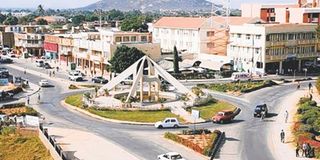Relocation: No smooth road leads to Dodoma

A view of part of the Dodoma Municipality Central Business District. Authorities will have to contend with major infrastructural challenges as the government fast tracks the transfer of all ministry and State department headquarters to the city in a new bid to complete a process that began in 1973. President Magufuli has said the move will be complete by the end of his first term in 2020. PHOTO I FILE
What you need to know:
- Some have described the decision by the ministries as “unrealistic” and a rushed bid to impress the President, who declared the shift to Dodoma will be complete by 2020 – three years from now.
Dar es Salaam. Political and economic analysts have continued to sound the alarms bells as government ministries compete to make shock announcements they are moving house to Dodoma, barely a fortnight after President John Magufuli’s declaration at the CCM extraordinary congress.
Some have described the decision by the ministries as “unrealistic” and a rushed bid to impress the President, who declared the shift to Dodoma will be complete by 2020 – three years from now.
But they are under pressure. President Magufuli gave ministries 14 days to submit their proposed plans stating how they were going to relocate.
Prime Minister Kassim Majaliwa set the pace last week when he announced he would be moving in September. During an interview with State-run TBC1 at the weekend, the minister responsible for policy and parliamentary affairs, Ms Jenista Mhagama, said a taskforce had already been formed to spearhead the PM’s move.
The team is expected to be in Dodoma this week to work on the ambitious relocation. The minister said whatever funds had been set aside for building projects in the 2016/17 budget would now be used in Dodoma.
Parliament could legitimise the move during the September seating, Prime Minister Majaliwa has also noted.
Logistical hurdles
Yet while the government may not be worried about legal roadblocks, it is the logistical hurdles that spell doom at the moment. Funding may also still prove to be the government’s vulnerable point, unless President Magufuli is ready to sacrifice some development projects for what some observers have termed “political expediency”.
Traditionally, funding and logistics have always been something of an Achilles heel for the move to Dodoma since the Father of the Nation, Julius Nyerere, mooted the idea.
“Generally, it is a good idea. But the speed at which the move is being implemented needs some form of control; if the pace is not limited, runners possibly fall,” former Prime Minister Edward Lowassa said during the Funguka na Tido interview on Azam TV at the weekend.
He said it was not just the Fifth Phase Government that wanted to make the historic move. Mr Lowassa, who before his infamous resignation was overseer of the civil service and government agencies in former President Jakaya’s Kikwete’s administration, said the Dodoma move has always been politically-motivated. University of Dar es Salaam (UDSM) lecturer, Prof Kitila Mkumbo, warned of possible budgetary ripple effects of an ad hoc as opposed to coordinated approach.
He told Political Platform: “There is no need for such a rush; there are still four complete years ahead. Budget concerns should be considered during implementation.”
Prof Mkumbo said the competition by government ministries to outdo each other in seeking impressive presidential approval ratings in acting on his orders could turn out to be the biggest undoing in the process.
Glaring realities
In a question and answer posted on its website in August last year, the City Development Authority (CDA), a government agency tasked with implementing the Dodoma transfer, highlighted some of glaring realities the government faces in Dodoma.
These include the lack of adequate and proper housing for the thousands of civil servants who are leaving Dar es Salaam for the administrative capital, shortage of hotels for the thousands of local and foreign visitors doing business with government and poor road infrastructure.
“… we don’t have enough guest houses, and this is not an issue of concern to the government alone. Just take a little example, when CCM meetings are held in Dodoma, delegates are accommodated even schools,” said CDA director-general Paskasi Muragili.
“… the party also rents other (sic) houses owned individuals to accommodate the delegates. This is another testimony that we are not ready for full transfer to Dodoma.
We are not capable of handling many guests and provide them with the necessary services at the same time. The Even the infrastructure hasn’t reached the required standard.”
But an economics analyst, Prof Haji Semboja, says the government’s full presence in Dodoma could spearhead and fast-track the city’s development. He notes that demand for real estate and improved infrastructure, supermarkets, international schools and hotels is expected to soar.
“The problem we face is that we planned for Dodoma while bodies and hearts are somewhere else,” he says.
Dr Ulingeta Mbamba, a UDSM lecturer, opines that the Fifth Phase Government could achieve its goal despite the huge challenges.
“It works better when senior government executives move first, then key ministries. A smooth transition should consider the availability of resources,” he said.
A political scientist, Dr Benson Bana, agrees. He says the fact that Dodoma is already home to the National Assembly, and the presence of the Chamwino State Lodge, is reason enough for all other government ministries to move.
Sources within government say endless meetings have been convened in ministries and key government departments to plan their Dar es Salaam exit strategy.
The extent of the role the private sector will play in what to some appears to be a “crash programme” remains to be seen. But the government has reached out to private players to chip with major real estate investments.




